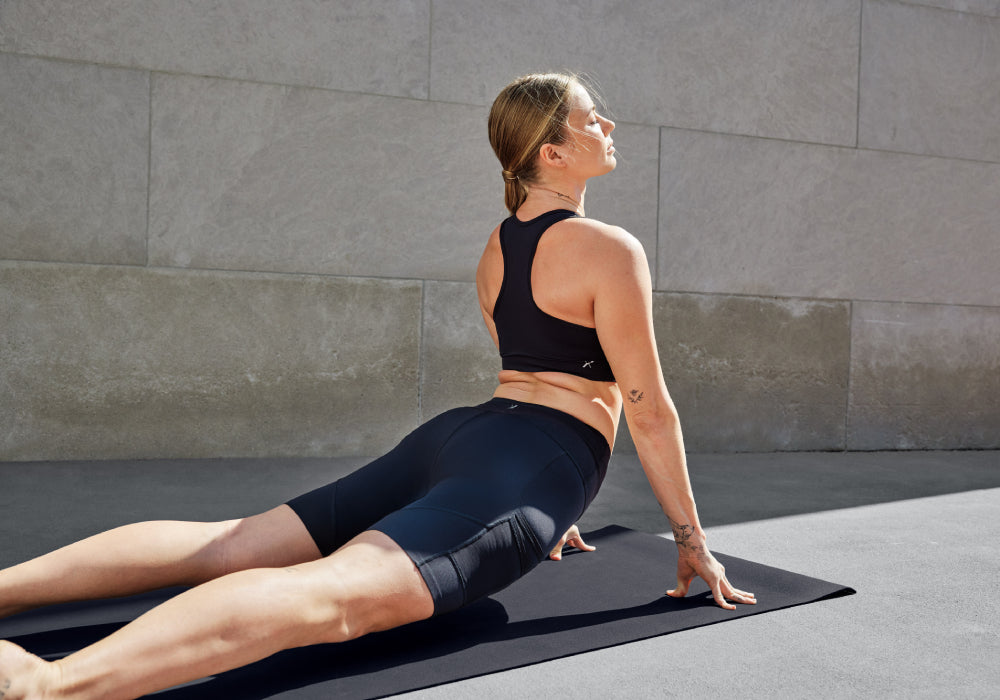Let's Talk Taboos: Why Do Bladder Leaks Happen?
Leaks happen — whether it’s blood, sweat, or pee. Contrary to tidy, mainstream depictions of movement, we know that in real life, workouts are messy and tousled affairs. With the upcoming launch of our new LeakStrong Activewear collection, featuring absorbent protection, we’re breaking barriers and talking taboos.
In this two-part series, we’re exploring pelvic health — including why bladder leaks happen and how pelvic health can be optimized. While we hope these insights are helpful, the main takeaway is this: there’s nothing embarrassing about leaks.
—
Over the past few years, pelvic health has evolved into somewhat of a buzzword. From TikTok videos aimed at improving pelvic floor strength to kegel challenges that claim to transform your sex life, it can be difficult to grasp exactly what a healthy pelvis looks and feels like — and why it’s so important.
As a nexus of physiological, neurological, and hormonal functions, your pelvic area is responsible for a lot. Anatomically, your pelvis provides support to vital organs, is key to sexual satisfaction, and is the cradle of life (and portal to the outside world) when you’re expecting. It’s also an area that can be particularly susceptible to lingering stress and trauma.
It’s no wonder, then, it’s a part of the body that warrants extra attention. But what are the telltale signs your pelvis could use some extra support? There are many, according to physical therapist and pelvic health expert, Stephanie Prendergast, but among the most common are: bladder leaks.
Though nearly half of women (and vulva-owners) in the US experience leaks at some point in their lives, the subject often remains taboo. With a little help from Stephanie and her decades of experience (she even wrote a book about pelvic pain), we’re opening the floodgates (pun intended) on leaks and why they happen.
What really sets the pelvic floor apart from other parts of the body is that its under autonomic control, meaning it's active without us thinking about it, but we also have voluntary control of the muscles, which can override its autonomic features. “As the bladder fills, the pelvic floor muscles get tighter to make sure we don’t leak,” Stephanie explains. She likens it to an instinctive, built-in reflex that can be overridden with intention when we have to pee.
It’s when pelvic floor muscles become dysfunctional that unintentional peeing and bladder leaks can become commonplace. If you have to change your underwear after you sneeze, you’re far from alone. And while there are lots of reasons you might be experiencing leaks (according to Stephanie, a whopping 90% of the population experiences pelvic dysfunction at some point), here’s a look at some of the most common culprits.
Your Workout Routine Is Intense
When pushing your body to its limits, it’s not uncommon for your bladder to send you a little reminder (in the form of dribbles) that you’ve reached your peak. And since an intense workout looks different for every body, this could happen as a result of lifting something that feels heavy for you or pushing the limits of your endurance during a cardio-based workout.
For those who are athletic, pelvic muscles have a tendency to tighten — at times, so tightly that they can’t close around the urethra which can cause leaks. But bladder leaks can also be a matter of pelvic floor fatigue, which can happen during higher impact exercises, like running or HIIT.
Ultimately, leaks during workouts happen due to muscle tightness, weakness, endurance, and motor control issues. “Everyone’s capabilities are going to vary based on physical strength,” says Stephanie. “For some people it may be one jumping jack, for others it may be 10 burpees at CrossFit.” Despite the range, there’s nearly always room to improve pelvic floor muscle function — “stats are very high with urinary leakage,” according to Stephanie.
Your Hormones Are Changing with Age
We were very surprised to find just how crucial hormones are when it comes to a happy, healthy pelvis. As vulva owners approach the 35-to-40 mark, pelvic muscles naturally begin to weaken as a result of receding testosterone and estrogen levels.
“These normal age-related changes can lead to leaking because the muscles become impaired and cannot contract as quickly or forcefully,” says Stephanie. “It’s the speed and the force.”
As you approach peri-menopause and menopause, circulating hormones decline and this has a significant impact on the genitourinary structures: the bladder, urethra, pelvic floor, vagina, and vulva. The good news is, this can be counteracted with pelvic strengthening exercises, physical therapy, and supplements that can help support hormone deficiencies when the time comes.
You Just Had a Baby
If you have kids or are expecting, you’re no stranger to the fact that pregnancy and childbirth can take a toll on your body — especially your pelvis. Stephanie is quick to criticize the lack of postpartum care in North America. In her opinion, pelvic floor therapy after birth is crucial — “pregnancy alone changes our body’s architecture,” she tells us.
From neural changes to abdominal wall separation, the core, bladder, and urethra are often in need of some serious support after welcoming a baby earth side. It’s normal for bodies to be transformed by the birthing journey, and part of that can involve serious bladder leakage.
Of course, the body is also incredibly resilient and pelvic physical therapy and neuromuscular exercises can go a long way. It may be a lot to manage with a baby strapped to your hip, so patience for your healing body is key. And there’s nothing wrong with a little back up support in the form of LeakStrong Leggings and undies until you get there.
—
We hope you found this post informative — but remember: we’re not doctors and this post is not medical advice! While all posts are fact-checked and well researched, we always recommend you chat with your doctor about any questions or concerns you might have regarding a medical condition. We’re here to support and educate, but never with the aim of disregarding professional medical advice you’ve been given. Phew, now that that’s out of the way, you can go on living unapologetically free.













